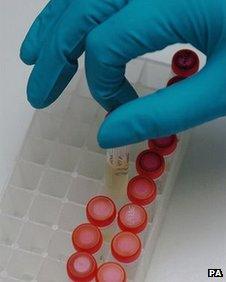Ban on clenbuterol doping drug may be relaxed
- Published

Alberto Contador claimed that eating beef led to his positive result
The World Anti-Doping Agency (Wada) will discuss controversial changes to drug rules at a meeting this weekend.
In Switzerland, Wada officials will consider relaxing the absolute ban on the drug clenbuterol, used illegally by athletes to build muscle.
Some athletes say their positive test results for the drug were caused by eating beef.
London's Olympic anti-doping chief says a minimum threshold would make testing more uniform.
Clenbuterol is a powerful drug used to treat asthma, but it can also help build up lean muscle mass and burn off fat.
The drug's growth-promoting ability has also found favour with beef farmers, particularly in China and Mexico.
The fact that humans can ingest the substance inadvertently by eating beef is putting pressure on Wada's rules, which deem the slightest trace to be a doping infringement.
During the 2010 Tour de France, the eventual winner Alberto Contador tested positive for a minute quantity of clenbuterol. Contador's defence was that he had eaten a contaminated steak that had been brought in from Spain.
His argument was accepted by the Spanish cycling federation. However, Wada has appealed against the decision, and after numerous delays the case is set to be heard at the Court of Arbitration in Sport in November.
Contador controversy
Some leading scientists believe that Wada should change the rules and bring in a minimum threshold as it has for the steroid nandrolone, which is found in small quantities in some vitamin supplements.
"Personally, I think that having some threshold would give some more uniformity to the test, but pragmatically we don't want to limit the sensitivity of tests," said Prof David Cowan from King's College London, who is in charge of anti-doping at next summer's London Olympic Games.
"Having a threshold as we do for many substances is a way to get some uniformity so we don't necessarily detect just one molecule.
"In any type of forensic investigation, it isn't only the presence but also the circumstances which are important when determining a case," he told BBC News.
In Contador's case, the amount of clenbuterol found by the Wada laboratory in Cologne was estimated to be 50 picograms (millionths of a millionth of a gram) per litre.
Mexican stand-off
According to Douwe de Boer, former head of the Dutch anti-doping laboratory - who has supported Contador's defence - other cases with higher amounts of the drug have not been prosecuted.
Wada is not prosecuting a table tennis player who was found with a level a third higher than Contador's.

The ban may be too restrictive, given the sensitivity of tests
Dr de Boer thinks that it would therefore not be fair to prosecute Contador.
Another difficulty for Wada has been the case of five Mexican footballers who all tested positive for clenbuterol at the Concacaf Gold Cup earlier this year.
The Mexican Football Federation cleared the players, saying they accepted they had accidentally ingested the material in beef. Wada is also challenging this decision.
The level of clenbuterol contamination in Mexican beef is believed to be high - a recent raid on a slaughterhouse found that 68% of the livestock had the drug in their systems.
Wada says it has tried to substantiate Contador's claim that beef in Spain shows evidence of clenbuterol, without success.
Dr de Boer believes that farmers in Spain do use the drug, but checks in abattoirs are not rigorous.
He said the probability of finding a positive animal is slim, given the statistics and the number of animals checked.
This summer, Wada's director of science, Olivier Rabin, was quoted as saying that a threshold for clenbuterol could be introduced.
At that time, the Contador case was set to be heard in August, making it possible for Wada to prosecute that case and then change the rules.
But now that the Contador case will not be heard until November, it makes it very difficult for the anti-doping officials to change their rules.
If they do, it would almost be impossible to continue with their current prosecutions.
If Wada sticks with the status quo, as it is likely to, the possibility remains that eating contaminated beef in some parts of the world could lead to more than indigestion.
- Published30 September 2010
- Published2 July 2010